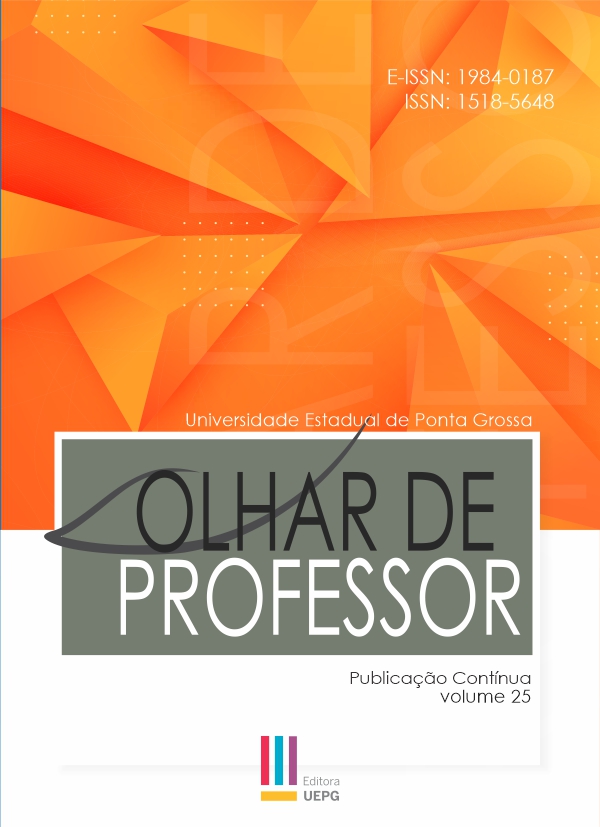Digital Technologies in the Education and the BNCC: proposal of a Student-Cyborg-Hacker
Main Article Content
Abstract
This paper has the purpose to analyze the impact of neoliberal discursive practices within the BNCC (Curricular Common National Basis) and the “ideal type” of the student/worker-entrepreneur in the Digital Culture. The methodological and theoretical approach leading this discussion is based on the perspective of the qualitative method and the bibliographic research in terms of the process. We will defend another possibilities of educative uses of Digital Technologies of Information and Communication that goes beyond technical purposes, presenting our against hegemonic conception of the Cyborgue-Hacker-Student.
Downloads
Article Details

This work is licensed under a Creative Commons Attribution 4.0 International License.
Authors who publish in this journal agree with the following terms:
a) Authors keep the copyrights and concede the right of its first publication to the magazine. The work piece must be simultaneously licensed on the Creative Commons Attribution License which allows the paper sharing, and preserves both the author identity and the right of first publication to this magazine.
b) Authors are authorized to assume additional contracts separately, to not-exclusively distribution of the paper version published in this magazine (e.g.: publish in institutional repository or as a book chapter), with the author identity recognition and its first publication in this magazine.
c) Authors are permitted and stimulated to publish and distribute their papers online (e.g.: in institutional repository or on their personal webpage), considering it can generate productive alterations, as well as increase the impact and the quotations of the published paper.
d) This journal provides public access to all its content, as this allows a greater visibility and reach of published articles and reviews. For more information on this approach, visit the Public Knowledge Project, a project that developed this system to improve the academic and public quality of the research, distributing OJS as well as other software to support the publication system of public access to academic sources.
e) The names and e-mail addresses on this site will be used exclusively for the purposes of the journal and are not available for other purposes.

This work is licensed under a Creative Commons Attribution 4.0 International License.
References
ADIRÃO, T.; PERONI, V. A formação das novas gerações como campo para os negócios? In: AGUIAR M. ; DOURADO L. (org.) A BNCC na contramão do PNE 2014-2024: Avaliação e perspectivas. Recife: ANPAE, 2018.
ALVES, G. Dimensões da Reestruturação Produtiva: ensaios de sociologia do trabalho. Londrina: Práxis; Bauru: Canal 6, 2007.
ANTUNES, R.; BRAGA, R. Infoproletários: degradação real do trabalho virtual. São Paulo: Boitempo Editorial, 2009.
APPLE M. W. Políticas Culturais e Educação. Porto: Porto Editora, 1999.
BONILLA, M. H.; PRETTO, N. Política educativa e cultura digital: entre práticas escolares e práticas sociais. Perspectiva, Florianópolis, v. 33, n. 2, p. 499-521, maio/ago. 2015.
BRASIL. Ministério da Educação. Base Nacional Comum Curricular. Brasília, DF, 2018.
FAIRCLOUGH, N. Discurso e mudança social. Brasília: Editora UNB, 2001.
FERNÁNDEZ, M. E. A face oculta da escola: educação e trabalho. Porto Alegre: Artes Médicas, 1989.
FRIGOTTO, G. Educação e a Crise do Capitalismo Real. São Paulo: Cortez, 2010.
HARAWAY, D. J. Manifesto ciborgue: Ciência, tecnologia e feminismo-socialista no final do século XX. In: TADEU, T. (org). Antropologia do ciborgue: as vertigens do pós-humano. Belo Horizonte, MG: Autêntica Editora, 2013, p. 33-118.
HIMANEN, P. A Ética dos Hackers e o Espírito da Era da Informação. Rio de Janeiro: Editora Campus, 2001.
HOQUET, T. Filosofia Ciborgue: Pensar contra os dualismos. São Paulo: Perspectiva, 2019.
INEP. Novas Competências da Base Nacional Comum Curricular (BNCC). 2022. Disponível em: http://inep80anos.inep.gov.br/inep80anos/futuro/novas-competencias-da-base-nacional-comum-curricular-bncc/79. Acesso em 20 out. 2022.
KRAWCZYK, N. Brasil – Estados Unidos: A trama de relações ocultas na destruição da
escola pública. In: KRAWCZYK, N. (org.). Escola pública: tempos difíceis, mas não
impossíveis. Campinas, SP: FE/UNICAMP; Uberlândia: Navegando, 2018, p. 59-72.
KUENZER, A. Exclusão includente e inclusão excludente: a nova forma de dualidade
estrutural que objetiva as novas relações entre educação e trabalho. In: SAVIANI, D.; SANFELICE,
J.L.; LOMBARDI, J.C. (org.). Capitalismo, trabalho e educação. 3. ed. Campinas: Autores
Associados, 2005. p. 75-96.
LAVAL, C. A Escola não é uma empresa: o neoliberalismo em ataque ao ensino público. São Paulo: Boitempo, 2019.
LAVAL. C. A nova razão do mundo: ensaio sobre a sociedade neoliberal. São Paulo: Boitempo, 2016.
LEMOS, A.; SEARA, S.; PÉRSIO, W. Hackers no Brasil. Revista Contracampo, n. 6, p. 21-42, 2002. Disponível em: https://periodicos.uff.br/contracampo/article/view/17322. Acesso em: 12 fev. 2022.
OCDE. Melhores competências, melhores empregos, melhores condições de vida: Uma
abordagem estratégica das políticas de competências. Publicações da OCDE, 2014. Disponível em: http://www.institutoalianca.org.br/new/biblioteca.pdf . Acesso em: 18 jul. 2022.
OCDE. O Capital Humano: Como o seu conhecimento compõe a sua vida. Publicações OCDE, 2007. Disponível em: https://www.oecd.org/insights/38435906.pdf . Acesso em: 18 jul. 2022.
PEREIRA, R. da S. Proposições da OCDE para América Latina: o Pisa como instrumento de padronização da educação. Revista Ibero-Americana de Estudos em Educação, Araraquara, v. 14, n. esp.3, p. 1717–1732, 2019. Disponível em: https://periodicos.fclar.unesp.br/iberoamericana/article/view/12756. Acesso em: 07 abr.2022.
PRETTO, N. Educações, culturas e hackers: escritos e reflexões. Salvador: EDUFBA, 2017.
RAMOS, M. N. Pedagogia das Competências: autonomia ou adaptação? São Paulo: Cortez, 2006.
SILVA, T. T. Monstros, ciborgues e clones: os fantasmas da Pedagogia Crítica In: SILVA, T. T. (org.). Pedagogia dos monstros: os prazeres e os perigos da confusão de fronteiras. Belo Horizonte: Autêntica, 2000.





